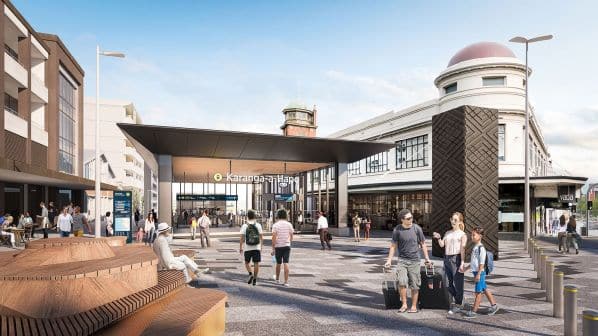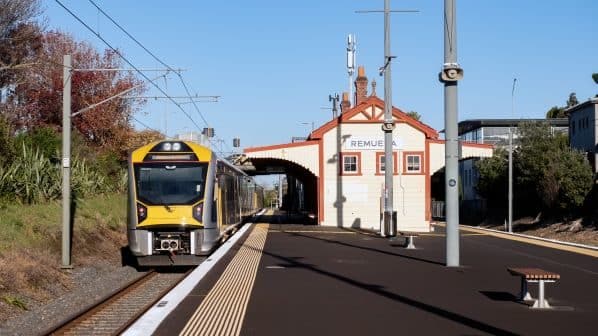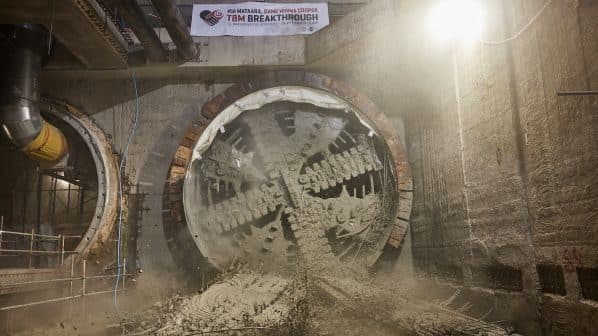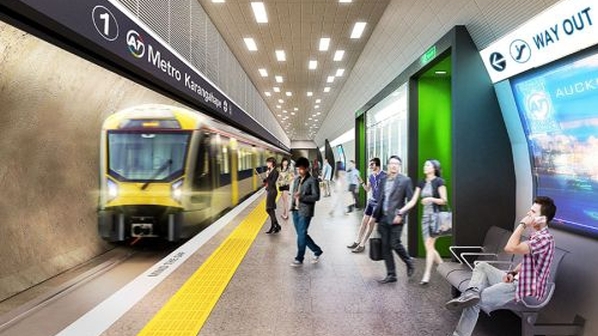CITY Rail Link (CRL), the company building the 3.45km twin-tunnel underground railway in Auckland, New Zealand, has submitted a formal funding request to its sponsors, the New Zealand government and Auckland Council, with a revised cost and timescale to complete the project as a result of the Covid-19 pandemic, lockdowns and associated impacts.
The cost of the project is now estimated to be $NZ 5.49bn ($US 3.39bn), a $NZ 1.07bn increase on the previous estimate of $NZ 4.42bn approved by the sponsors in May 2019.
CRL has also revised the project completion date, with construction of the stations and supporting rail infrastructure now expected to be completed by the Link Alliance by November 2025.
CRL chief executive, Dr Sean Sweeney, says the extra funding and additional time for completion is primarily due to the impact of the Covid-19 pandemic, including time lost for on-site work and knock-on effects on the supply chain, resourcing, materials, and labour costs.
The CRL is New Zealand’s largest ever transport infrastructure project and will transform the downtown Waitematā station (formerly Britomart) into a through station that will more than double rail capacity across Auckland. Two new stations, Te Waihorotiu and Karanga-a-Hape, are under construction while Mount Eden Station is being rebuilt and renamed as Maungawhau/Mount Eden.
CRL says increasing costs and delays are a global problem for major infrastructure projects. In Australia, state governments have spent $A 34bn ($US 22.58bn) more than budgeted on projects including Sydney’s WestConnex, the West Gate Tunnel in Melbourne and Brisbane’s Cross River Rail. The extra amount spent on Australian major projects comparable to the CRL was 30% over budget on average, with the impact of the Covid-19 a significant contributory factor.
The cost increases and delays to large infrastructure projects like the CRL stem from a complex, interrelated series of factors broadly caused by the pandemic, including:
- direct Covid impacts, such as loss of hours worked due to lockdowns, Covid restrictions and illness
- labour costs, including construction sector wage inflation, longer employment periods due to Covid delays, and problems recruiting expert staff for upcoming phases in a highly competitive international construction market, and
- materials costs, with 70% of all building products imported or relying in part on imported components, while shipping costs have increased by 785% between November 2019 and September 2021.
Inflation has hit construction harder than other sectors. New Zealand has the seventh highest rate of construction price inflation among countries belonging to the Organisation for Economic Co-operation and Development (OECD), and NZ Transport Association figures show an increase of nearly 20% in the cost of building supplies in the 18 months to the second quarter of 2022.
The cost of construction supplies needed for the CRL project have increased by:
- reinforced concrete floor slabs, 13.4%
- D32mm rods, 13.8%
- fibre cement sheets, 10%, and
- steel cladding, 9.5%.
In addition, CRL says there are Covid impacts that are difficult to quantify but have had a material effect on the project, including negative productivity and lost opportunity costs due to lockdown and illness, ongoing labour constraints, supply chain disruption and resource scarcity.
CRL says it does not have full visibility of the financial and timescale impact of some of these factors but major variances over budgeted and actual spend levels demonstrate the significant impact of lost time and resourcing challenges resulting from the Covid-19 pandemic.
“People need to remember that in Auckland we endured two Level 4 lockdowns, a further 280 days of restricted working conditions and we lost 3.2 million hours through illness among staff, with 800-plus workers infected,” Sweeney says.
“The request for extra funding has not and will not delay continuing work on the project, which is progressing well. Together with our contractors Link Alliance, we have got through Covid and surmounted its impacts and are now well advanced in our work to build New Zealand’s first underground metro rail network.”
Following the end of the construction programme, CRL will hand over the completed infrastructure to national railway KiwiRail and local transport authority Auckland Transport, who will then carry out the additional work required to open the CRL to passengers.
For detailed data on rail projects around the world, subscribe to IRJ Pro.




